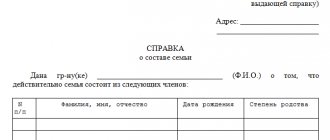A homeowners' association is a legal entity that is created for the purpose of managing an apartment building and common property.
The activities of HOAs are regulated by certain regulatory legal acts.
Previously, there was a single law that directly related to the activities of owners' associations. Currently, issues of this nature are regulated by the Civil and Housing Codes of the Russian Federation. They contain all the main provisions related to HOAs. Including the creation and liquidation of partnerships, as well as membership in them.
Homeowners' Association Law
The main regulatory act, which previously regulated everything related to the activities of HOAs, was the Federal Law of June 15, 1996 No. 72-FZ “On Homeowners' Associations.”
He established the following concepts:
- A homeowners' association is a non-profit organization created for the joint management and operation of common property.
- The homeowner is the owner of the property in the house.
- Premises - a unit in a residential area intended for technical needs or living.
- Common property is a part of a residential area necessary for its operation.
- A condominium is a single complex that includes not only the house itself, but also the surrounding area.
- Participatory share is a part of the common property belonging to the owner.
- Developer is any individual or legal entity engaged in the construction, acquisition or reconstruction of real estate.
These concepts are closely related to the activities of HOAs.
Scope of regulation
Law No. 72-FZ had a certain scope of regulation. It extended to relations related to property in a residential area that belonged to two or more owners, HOAs and housing cooperatives. It regulated the interaction that arose on the territory of the country with the participation of domestic and foreign individuals and legal entities.
Adoption history
Law No. 72-FZ was adopted in 1996. This was due to the need to systematize and streamline legal relations between property owners. Before the adoption of this regulatory act, only some laws stated that homeowners had the right to create partnerships. However, more specific information was not contained anywhere. And since the activities of HOAs have their own specifics, a separate regulatory legal act was needed that would regulate issues of this nature. For this reason, Law No. 72-FZ was adopted.
Grounds for cancellation
Federal Law No. 72-FZ is currently not applied because it has lost force.
This happened in connection with the introduction of the Housing Code of the Russian Federation. The official date of repeal of Law No. 72-FZ is March 1, 2005. It was from this date that the new edition of the Housing Code of the Russian Federation began to operate. The cancellation occurred due to the fact that a whole section concerning the activities of HOAs was introduced into the Housing Code. For this reason, Law No. 72-FZ has lost its relevance.
Who was bothered by advertising?
The house at 133a-133b Moskovsky Prospekt, built in 1979-1980, is also managed by a homeowners association. Here, active owners closed the issue of major repairs, were among the first to join the federal program, and created a security system. The house, yard and parking lot were surrounded by a fence, surveillance cameras were installed along the entire perimeter, the video from which was broadcast in a special duty room. The fire alarm control panel is located in the same room. In addition, the duty officer is an in-house dispatcher: he receives complaints from residents, calls emergency services, police, ambulance, and so on.
There was also a library and a leisure room in the house. In 2015, the Federal Fund for Assistance to Housing and Public Utilities Reform awarded the residential building the status of a house of exemplary maintenance. In total, there are about a hundred objects in the country that have earned this title.
Without receiving any financial support from local authorities, the HOA also faces obstacles when trying to earn money on its own. Previously, the partnership leased two hundred square meters of the facade to advertisers, which allowed the house to receive 400 thousand rubles annually. However, at some point, municipal authorities issued a resolution prohibiting HOAs from placing banners and panels on the facades.
“The Federal Law “On Advertising” allows apartment owners to use common property for the installation and operation of advertising structures,” explains Vladimir Larionov, Chairman of the Board of the Moskovsky HOA. “Unfortunately, the same law allows municipal authorities to decide at their own discretion whether advertising does not violate the external architectural appearance of the existing development. And Kaliningrad officials, who for some reason are not bothered by the numerous banners and streamers that fill the central streets, decided: there should be no advertising on our facade. This requires clarification in the legislation. We have repeatedly written appeals to the State Duma of the Russian Federation, involved deputies from the Kaliningrad region, but so far the issue has not been resolved.
Current legislature
Currently, issues related to the activities of HOAs are regulated by the norms of the Housing and Civil Codes of the Russian Federation. These legal acts contain articles and sections relating to this area.
Housing Code
The Housing Code of the Russian Federation most widely covers the activities of homeowners' associations. It contains an entire section 6, which regulates issues of this nature. It specifies the procedure for creating, reorganizing and liquidating an organization, its terms of reference, the rights and obligations of members, management and execution bodies, the competence of audit commissions, a list of property, and the specifics of economic activity. Also, separate articles of the Housing Code specify the procedure for holding general meetings.
Civil Code
The Civil Code of the Russian Federation also contains information related to HOAs. Specifically, Article 290 specifies a list of common property in an apartment building, and Article 291 secures the right of owners to form partnerships.
Article 3. Legislation and other legal acts on condominiums and homeowners’ associations
1. The legislation on condominiums and homeowners' associations relates to civil legislation and includes this Federal Law, the Civil Code of the Russian Federation, and other legislative acts of the Russian Federation regulating civil legal relations.
Housing legal relations contained in the legislation are also regulated by other legislative acts of the Russian Federation and legislative acts of the constituent entities of the Russian Federation.
2. The relations specified in Article 2 of this Federal Law may be regulated by decrees of the President of the Russian Federation, decrees of the Government of the Russian Federation in accordance with federal laws.
Creation procedure
The process of forming a partnership consists of several successive stages. Any owner of real estate in a residential area can initiate the procedure. However, persons who do not have this status do not have such a right.
First, it is necessary to inform all owners about the general meeting, at which the corresponding decision will be made. The most common way is to post information in public places. This could be the entrance. Personal notification of each owner is also allowed. But this option is more time-consuming. Regardless of the method, the owners must be informed of the date, time and place of the meeting, as well as the issues that will be brought up for general discussion. It should be noted that not only the owners themselves, but also their legal representatives can take part in the procedure. The latter must have powers of attorney.
A positive decision will be valid only if more than half of the owners voted for it, that is, fifty percent plus one person. The results of the meeting are documented in minutes.
Its text should indicate:
- Date and location.
- Total number of people present.
- Information about the chairman and secretary.
- Issues submitted for general discussion. In this case it will be the creation of a partnership.
- Number of votes for, against and abstentions.
The protocol must be signed by all those who voted for the creation of the partnership. Simultaneously with the creation of the organization, its Charter must be approved. After this, the partnership must be registered. To do this, you will need to make copies of the protocol and the Charter and have them certified by a notary. Next, these documents, together with the application and information about those who voted for the creation of the organization, are sent to the Federal Tax Service. At the end, the HOA is entered into the register of legal entities and a certificate of registration is issued, which is kept by the board.
A partnership can be created not only by the owners of apartments in the same building. This right is given to residents of several areas located within the same area, as well as owners of neighboring private houses and summer cottages.
Violations in the HOA, what to do
The management chosen by the residents has two years to prove itself. If the deadline has expired and there are a lot of complaints, then you need to contact the housing complex, it says what to do.
Firstly, all members of the HOA can meet and consider complaints against the managers of the HOA. If there are complaints against the chairman or the board, you need to notify all residents in writing, indicating where to gather and why.
At the meeting, only the problem posed can be solved and nothing else is discussed.
Next you need to send notifications to all members of the partnership. This can be done in person, or by registered mail.
If two-thirds of the members gather on the specified date and time, then the decision of the meeting will be legal.
It can be led by both the chairman and his deputy. If they are not there, then any other participant. At the meeting it will be decided whether to re-elect the leadership or not.
The last option is to do otherwise and send your requirements to the Rospotrebnadzor Office.
Organization membership
You can join a partnership on the basis of an application sent to the board. However, only the owner of the property has this right. They do not have to be the one who took part in the construction of the house as a shareholder. The buyer, recipient or heir of the property can become a member of the HOA, provided that he has registered his ownership rights in the manner prescribed by law. In the same way, exit from the HOA occurs. The person will have to submit a corresponding application. Regardless of the nature of the appeal, the final decision is made at the general meeting. At the same time, a person cannot be denied his request, since membership in the partnership is possible only on a voluntary basis.
A person who has joined an organization must provide information about himself and his real estate for inclusion in a special register. The information must be reliable.
The water was knee-deep
The Inzhenernaya-4 HOA has additional sources of income. Chairman of the Board Nele Suslova managed to return the non-residential premises on the ground floor from municipal property to common property. Now it has been converted into an office for the partnership; part of the premises is rented out for six thousand rubles a month. Another five thousand is paid by the company that installed a device for selling water in the house. But there is always not enough money, because a residential building built in 1983 has a lot of expenses. Especially when residents carry out major repairs themselves, accumulating funds in a special account.
There are 250 thousand apartment buildings in the region, and only 250 are managed by HOAs
“We created the HOA in 2021 out of despair,” says Nelya Suslova. “Before this, so many management companies changed, no one could restore order. The roof was leaking, rats were running around in the basement, and on the first floor the water was knee-deep. Over the course of three years, we renovated the first floor, replaced the emergency electrical cable, eight risers, entrance doors, mailboxes, and installed a video surveillance system. This year we are finishing work on a complete replacement of the lighting system. Now the house is dry, light and warm, but there is a lot of work ahead; the roof, basement, courtyard need to be put in order, the facades updated, and three more risers need to be replaced. It would be great if HOAs that clean up their houses on their own would receive budget co-financing or interest-free loans for repairs and improvements. As for the yard, we really hope to become participants in the municipal program “My Yard”. We take care of the yard ourselves, but we need to lay paving slabs and resolve the issue with communications - we cannot cope with this without support.
Management Bodies
In accordance with Article 144 of the Housing Code of the Russian Federation, the management bodies of the partnership are determined. They are the general meeting and the board. Each of them is endowed with their own powers.
The General Meeting is the main body. It is he who makes the final decisions on any issues relating to the activities of the partnership. The specific list of members of such a body is determined by the participants of the organization. Decisions are made based on the majority of voters who took part in the meeting.
The competence of this body includes the following:
- Approval of the Charter and amendments to its content.
- Reorganization and liquidation of the partnership, appointment of a commission for this, approval of interim and final balance sheets.
- Board elections.
- Appointment of auditors.
- Determination of the amount of mandatory membership payments and contributions.
- Creation of a reserve fund.
- Obtaining loans and credits.
- Development and approval of plans for the repair of common property for the year, as well as cost estimates, reports, and auditors’ opinions.
- Conducting proceedings on complaints against the board and its chairman.
- Development and approval of internal rules of procedure for specialists who are involved in the maintenance of common property.
- Establishing the amount of remuneration for the chairman and members of the board.
The general meeting may also consider other issues if this does not contradict the requirements of the current legislation.
The board of the partnership is the executive body. He is subordinate and accountable to the general meeting. It usually consists of an odd number of members. They elect a chairman and a secretary.
The responsibilities of such a body include:
- Strict compliance with the requirements of current legislation and the rules of the organization’s Charter.
- Monitoring the process of making mandatory payments and contributions by owners.
- Preparation of financial estimates and reports.
- Management of a residential area or conclusion of necessary contracts.
- Hiring specialists to maintain common property.
- Maintaining a register of HOA members.
- Organization and holding of the general meeting.
- Perform other duties specified by the organization’s Charter.
At the same time, the general meeting has the right to resolve issues that fall within the competence of the board.
The most transparent
According to the state housing and communal services information system, in the westernmost Russian region there are about 25 thousand apartment buildings.
Of these, only 250 are managed by voluntary associations of active owners. About eight thousand more houses have chosen direct management, in which homeowners enter into contracts for the provision of utility services on their own behalf. But this model is not suitable for residential buildings with more than 30 apartments. Basically, Kaliningrad apartment buildings are managed by commercial management companies. “In my opinion, HOAs are the most effective and most transparent organizational form in the utility market,” comments the head of the Kaliningrad regional center for public control in the housing and communal services sector, member of the regional public chamber Valentina Zosimenko. — An HOA is a non-profit organization, although it may have additional income. However, all the money that remains after settlements with resource suppliers goes towards landscaping, ongoing maintenance of common property, and administrative expenses. For five years now, at various seminars and round tables, I have been talking about how important it is to create incentives for the formation of HOAs. We are talking, in particular, about financial incentives. After all, now the partnership actually cannot exist if it does not have some additional income in addition to payments from residents.
Authority
The law imposes a number of obligations on the partnership itself. These include:
- Compliance with the requirements of general regulatory legal acts, as well as the Charter of the partnership.
- Residential area management.
- Fulfillment of contractual obligations.
- Ensuring the proper technical and sanitary condition of common property.
- Respect for the rights and legitimate interests of owners, as well as control over the fulfillment of their obligations for the maintenance of the residential area.
- Taking measures to stop actions that may cause damage to common property.
- Representing the interests of owners in relations with third parties.
- Maintaining a register of partnership members.
- Submission to the authorities of information on changes made to the Charter within three months from the date of state registration of the amendments. In this case, it is necessary to attach certified copies of protocols and additions.
The terms of reference of the partnership may be expanded by the rules of the Charter.
Organization's activities
For full functioning, the partnership has the right to carry out certain types of activities.
These include:
- Operation, maintenance and repair of real estate in a residential area.
- Construction of additional buildings and common property in the house.
- Transfer of part of material assets for temporary use to third parties. Here we are talking about renting and hiring.
Income received from the rental of property must be spent on the needs of the partnership. The specific intended use of the proceeds is determined by the general meeting of the HOA.
Management of housing and communal services in municipal districts and urban districts of the Moscow region
Appealing to the president is a last resort. To solve housing and communal services problems, there are relevant officials and management organizations locally.
Program for major repairs of common property in apartment buildings in the Moscow region
MUNICIPAL AREAS
Volokolamsky Voskresensky Dmitrovsky Egoryevsky Zaraisk Istra Kashirsky Klinsky Kolomensky Krasnogorsky Leninsky Lotoshinsky Lukhovitsky Lyuberetsky Mozhaysky Mytishchisky Naro-Fominsky Noginsky Odintsovo Ozersky Orekhovo-Zuevsky Pavlovo-Posadsky Podolsky Pushkinsky Ramensky Ruzsky Sergiev Posadsky Serebryano-Prudsky Serpukhov Solnechnogorsky Stupinsky Taldomsky Chekhovsky Shatursky Shakhovsky Shchelkovsky
CITY DISTRICT
Balashikha Bronnitsy Vlasikha Voskhod Dzerzhinsky Dolgoprudny Domodedovo Dubna Zheleznodorozhny Zhukovsky Zvenigorod Star City Ivanteevka Klimovsk Kolomna Korolev Kotelniki Krasnoarmeysk Krasnoznamensk Lobnya Losino-Petrovsky Lytkarino Youth Orekhovo-Zuyevo Podolsk Protvino Pushchino Reutov Roshal Serpukhov Trinity to Fryazino Khimki Chernogolovka Shcherbinka Elektrogorsk Elektrostal Yubileiny
Liquidation procedure
The procedure for liquidating an HOA is not specified in the Housing Code. He makes only reference to the norms of civil law.
Reasons may include:
- The withdrawal of members from a partnership, as a result of which less than half of the property owners remain in it.
- Violation of the procedure for creating an organization.
- Expiration of the license to manage the house.
- Carrying out activities prohibited by law and the Charter.
The initiators can be the residents themselves, regulatory and supervisory government bodies.
The liquidation procedure consists of the following stages:
- Establishing the initiator.
- Formation of a list of organization members.
- Drawing up an application for liquidation of the partnership. It is signed by all owners who agree with it.
- Submitting an appeal to the HOA board or court.
- Making an appropriate decision.
- Creation of a liquidation commission.
- Sending information to the Federal Tax Service and the media.
- Drawing up a liquidation balance sheet.
- Repayment of debts to service organizations.
- Sending documents to close a partnership.
The time period for liquidation of a partnership is not defined by law.
This duration is established only for certain periods. For example, information must be sent to the tax authorities within three days from the date of adoption of the relevant decision, and the liquidation balance sheet can be drawn up no earlier than two months later. In practice, the liquidation procedure can last up to a year.
Also, to implement the procedure, you will need an application, a decision of the general meeting, a financial balance, a receipt for payment of fees, information about the organization’s employees in the Pension Fund. In some cases, additional information may be required, such as a court decision.







